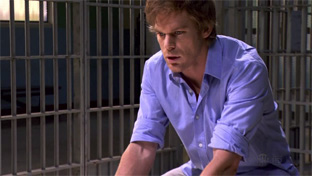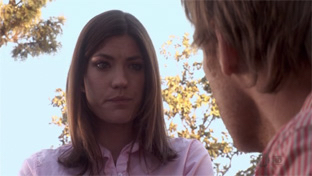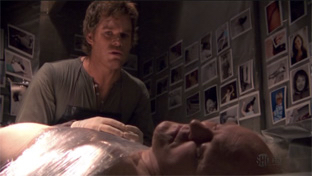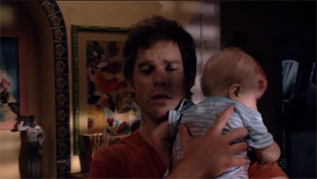Empathy for a Serial Killer
08/01/10 06:49 PM Filed in: Christianity | Life
Dexter is the eponymous character of the Showtime television series. He is a father, husband, and forensic analyst for the Miami-Metro Police Department. He is also a serial killer. Dexter is a dark and violent show that nevertheless has important things to say about human nature. In many ways, it is a "proto-Christian" work.
This will be illustrated after the break with quotations taken from the fourth season of the show. Warning: graphic language and spoilers follow.
This will be illustrated after the break with quotations taken from the fourth season of the show. Warning: graphic language and spoilers follow.
Because of a traumatic childhood, Dexter believes that he is driven to kill by urges that he cannot control. He assuages his conscience by only killing those he deems deserve death, i.e., other killers who have escaped the justice system. In the fourth season, Dexter faces another serial killer, Arthur Mitchell (played by John Lithgow), who is being pursued by the FBI for a series of murders going back thirty years.
In this scene, Dexter is in jail for an altercation with police after damaging another vehicle with his car and leaving the scene of the accident. Although he is alone in the cell, Dexter is having a conversation between himself and his deceased father, who often appears to him in his imagination.
 (Father) Why are you even in here?
(Father) Why are you even in here?
(Dexter) Because of Arthur fucking Mitchell.
Wrong.
All right. I'm here because I didn't follow the code. Everything you taught me was to keep me out of here.
What else?
What do you want me to say? I'm here because I lost it? Yes, I fucking lost it.
On a fucking cop! Like a fucking amateur.
Fuck you! It's your number one rule: don't get caught. They were going to find him. They were going to find me with an unconscious man.
That's not why you lost it! That's not why you're in here.
I couldn't just let them find him, God damn it. I have to be the one to kill him! I have to know he's gone. For my family!
Exactly. You can't think clearly because of them. They've done this to you.
No, my "dark passenger" has done this to me. It's ruining my life.
It is your life.
I don't want it to be. I don't want it.
"The code" is the set of rules that Dexter's father devised to keep his child out of jail. The "dark passenger" is the uncontrollable urge to kill. It is something Dexter doesn't want, but the code is unable to change who he is. The parallels to Christianity are obvious: "the code" is "the Law", and the "dark passenger" is sin. The Law is incapable of changing us or keeping us out of trouble. External rules simply cannot work. Dexter's dialog with himself is reminiscent of St. Paul, when he wrote:
If Dexter struggles with who he is, his wife, Rita, assures him that he can overcome his darkness.
 (Rita) You have your demons. I accept that. Because I know that you don't have to be a slave to them.
(Rita) You have your demons. I accept that. Because I know that you don't have to be a slave to them.
I wish that were true.
It is! I know you, better than you know yourself. You can conquer whatever darkness is in you. I know you can.
Intentional or not, the use of light and darkness in this scene is inspired. Rita epitomizes the false hope that man can be his own master; she is a false dawn. This may be one reason why she was killed in the season's final episode. No hope is better than false hope.
In having watched all four seasons in fairly short order, I don't believe that I've ever heard Dexter say "I love you" to anyone -- not to his sister, wife, or step children. In this scene, Dexter appears to be genuinely touched by the love expressed by Debra, his sister. But Dexter is a man who wears so many masks that it's difficult to tell what is real.
 (Deb) I love you.
(Deb) I love you.
I'm so thankful.
Debra's love isn't because of what Dexter is -- she doesn't know he's a serial killer -- but for what he has done for her. Still, it's a shadow of God's love for us. He sees underneath all of our masks and, as St. Paul wrote, loves us anyway: "But God demonstrates His love for us, in that while we were yet sinners, Christ died for us."
In this very powerful scene, Dexter has caught Arthur Mitchell and is having a final conversation with him before delivering the fatal blow.
 (Mitchell) You think you're better than I am?
(Mitchell) You think you're better than I am?
No. But I want to be.
You can't control the demon inside of you any more than I can control mine.
Did you ever actually try?
My God, yes. I prayed to be changed; to be made different.
That's not trying, that's waiting to be stopped.
It worked, didn't it? Case in point.
So what's the alternative, Arthur? Leave? Disappear? Fake my own death and start over again?
No. You'll still be you.
What's striking is that Dexter sees clearly where many Christians do not. Too many Christians pray for what they already have. God has changed us, is changing us, and will change us into the image of His Son. Far too often we ask for that which we already have.
Here, Dexter is leaving the scene of his wife's death at the hand of Arthur Mitchell. Just as Dexter witnessed the death of his mother at an early age, history is repeated with his son.
 It doesn't matter what I choose. What I do. I'm what's wrong.
It doesn't matter what I choose. What I do. I'm what's wrong.
This is the point at which the Gospel makes sense, when we recognize "I'm what's wrong" and only God can fix the problem, through uniting us to the death, burial, and resurrection of Jesus.
In this scene, Dexter is in jail for an altercation with police after damaging another vehicle with his car and leaving the scene of the accident. Although he is alone in the cell, Dexter is having a conversation between himself and his deceased father, who often appears to him in his imagination.

(Dexter) Because of Arthur fucking Mitchell.
Wrong.
All right. I'm here because I didn't follow the code. Everything you taught me was to keep me out of here.
What else?
What do you want me to say? I'm here because I lost it? Yes, I fucking lost it.
On a fucking cop! Like a fucking amateur.
Fuck you! It's your number one rule: don't get caught. They were going to find him. They were going to find me with an unconscious man.
That's not why you lost it! That's not why you're in here.
I couldn't just let them find him, God damn it. I have to be the one to kill him! I have to know he's gone. For my family!
Exactly. You can't think clearly because of them. They've done this to you.
No, my "dark passenger" has done this to me. It's ruining my life.
It is your life.
I don't want it to be. I don't want it.
"The code" is the set of rules that Dexter's father devised to keep his child out of jail. The "dark passenger" is the uncontrollable urge to kill. It is something Dexter doesn't want, but the code is unable to change who he is. The parallels to Christianity are obvious: "the code" is "the Law", and the "dark passenger" is sin. The Law is incapable of changing us or keeping us out of trouble. External rules simply cannot work. Dexter's dialog with himself is reminiscent of St. Paul, when he wrote:
I do not understand my own actions. For I do not do what I want, but I do the very thing I hate. Now if I do what I do not want, I agree that the law is good. But in fact it is no longer I that do it, but sin that dwells within me. For I know that nothing good dwells within me, that is, in my flesh. I can will what is right, but I cannot do it. For I do not do the good I want, but the evil I do not want is what I do.
Now if I do what I do not want, it is no longer I that do it, but sin that dwells within me. So I find it to be a law that when I want to do what is good, evil lies close at hand. For I delight in the law of God in my inmost self, but I see in my members another law at war with the law of my mind, making me captive to the law of sin that dwells in my members. Wretched man that I am! Who will rescue me from this body of death?
-- Romans 7:15-24, NRSV
If Dexter struggles with who he is, his wife, Rita, assures him that he can overcome his darkness.

I wish that were true.
It is! I know you, better than you know yourself. You can conquer whatever darkness is in you. I know you can.
Intentional or not, the use of light and darkness in this scene is inspired. Rita epitomizes the false hope that man can be his own master; she is a false dawn. This may be one reason why she was killed in the season's final episode. No hope is better than false hope.
In having watched all four seasons in fairly short order, I don't believe that I've ever heard Dexter say "I love you" to anyone -- not to his sister, wife, or step children. In this scene, Dexter appears to be genuinely touched by the love expressed by Debra, his sister. But Dexter is a man who wears so many masks that it's difficult to tell what is real.

I'm so thankful.
Debra's love isn't because of what Dexter is -- she doesn't know he's a serial killer -- but for what he has done for her. Still, it's a shadow of God's love for us. He sees underneath all of our masks and, as St. Paul wrote, loves us anyway: "But God demonstrates His love for us, in that while we were yet sinners, Christ died for us."
In this very powerful scene, Dexter has caught Arthur Mitchell and is having a final conversation with him before delivering the fatal blow.

No. But I want to be.
You can't control the demon inside of you any more than I can control mine.
Did you ever actually try?
My God, yes. I prayed to be changed; to be made different.
That's not trying, that's waiting to be stopped.
It worked, didn't it? Case in point.
So what's the alternative, Arthur? Leave? Disappear? Fake my own death and start over again?
No. You'll still be you.
What's striking is that Dexter sees clearly where many Christians do not. Too many Christians pray for what they already have. God has changed us, is changing us, and will change us into the image of His Son. Far too often we ask for that which we already have.
Here, Dexter is leaving the scene of his wife's death at the hand of Arthur Mitchell. Just as Dexter witnessed the death of his mother at an early age, history is repeated with his son.

This is the point at which the Gospel makes sense, when we recognize "I'm what's wrong" and only God can fix the problem, through uniting us to the death, burial, and resurrection of Jesus.
blog comments powered by Disqus

